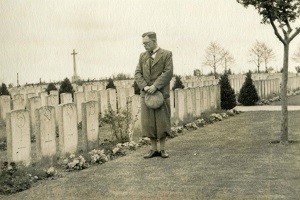The effects of the First (or Great) World War
There is little doubt that the nation’s fascination with all matters relating to WW1 will continue for centuries. The reasons for this are bound up in such issues its status as a major milestone on human society’s perhaps inevitable route to potential self-annihilation; the fact that its destructive powers affected in a very real and personal sense almost every family in the British Isles in one form or another; its convenience as a suitable ‘catch-all’ perceived starting-point for the end of monarchies, the British Empire and any number of other time-honoured political systems around the world; the stirrings of widespread Western-style democracy and globalisation; wholesale advances in the cause of female emancipation, trade unions, workers rights and science (particularly in the fields of armaments and trauma medicine); and indeed just about anything else you would care to imagine – even perhaps the beginnings of a general awareness that ‘the Establishment’ – whatever that meant in any context – didn’t necessarily always know best and could quite easily become (by default if not by action) powerless to bring an end to something as horrendous as a state of total war and mindless slaughter, still less (going back a phase) actually prevent it happening in the first place.
Adapting for this purpose the old saying “There’s always someone worse off than yourself”, when it comes to research generally – no matter how conscientious and anally-retentive or ‘sad’ you strive to (or have) become – as night follows day, there is always someone who has done more research than you, or who knows more than you and/or even forgotten more than you will ever know.
In my experience it is very much the case with matters pertaining to WW1.
 This is the reason that many amateur/hobby researchers such as myself routinely remain resolutely humble when addressing any WW1 subject because harsh experience over time has taught us to retain an attendant expectation that – the moment one put one’s head above the parapet and make any supposed statement of fact and/or theory – it will almost certainly (and justifiably) be trumped, criticised or simply proved conclusively and sometimes fatuously wrong by random teams of experts whose delight at uncovering new research material is only exceeded by that of having the opportunity to prove that others have been barking up the wrong tree.
This is the reason that many amateur/hobby researchers such as myself routinely remain resolutely humble when addressing any WW1 subject because harsh experience over time has taught us to retain an attendant expectation that – the moment one put one’s head above the parapet and make any supposed statement of fact and/or theory – it will almost certainly (and justifiably) be trumped, criticised or simply proved conclusively and sometimes fatuously wrong by random teams of experts whose delight at uncovering new research material is only exceeded by that of having the opportunity to prove that others have been barking up the wrong tree.
I guess you might say this comes under the general and damning heading ‘academic conceit’.
 I am a member of the Western Front Association, which periodically publishes a magazine called Stand To! [a reference to the military term/order to ‘stand to attention’ and remain alert for potential imminent attack, routinely given at dawn and/or dusk in the trenches] that is always well worth reading from cover to cover because of the breadth, depth and illuminating nature of its articles.
I am a member of the Western Front Association, which periodically publishes a magazine called Stand To! [a reference to the military term/order to ‘stand to attention’ and remain alert for potential imminent attack, routinely given at dawn and/or dusk in the trenches] that is always well worth reading from cover to cover because of the breadth, depth and illuminating nature of its articles.
It regularly reinforces my aforementioned sense of ‘humility’, as someone interested in the subject generally, by the force of its accumulated detailed research and knowledge that continually reminds me of the syndrome that ‘the more you learn, the more you realise how much more there is to know’.
In the latest issue, the respected WW1 academic and broadcaster Peter Barton makes the powerful case that – for all the ongoing research and commemorations conducted in and by the United Kingdom, even ceremonies such as the one I watched ‘live’ on television at the Menin Gate in Ypres and elsewhere on 30th July, the day before the actually centenary of the commencement of the Third Battles of Ypres (better known as Passchendaele) – ‘our’ view of the battlefield events of 1914-1918 is decidedly one-sided and in many respects potentially misleading.
Barton points to the fact that there is a great wealth of material in German archives that gives ‘the other side’s view’ of all the great actions of WW1 and much of what exists to be ‘mined’ in the future – as will surely happen – will provide a new perspective upon, if not directly challenge, the long-held stereotypical UK vision – if not sometimes myth – of our ‘stout British lads’ going steadfastly over the top, following their brave young officers as they did, to almost unimaginable slaughter and destruction in a form of admirable and heart-stirring collective quasi-suicidal enterprise.
Which brings me to my topic of the day – another example of some WW1 discoveries, this time in the UK – as reported today by Ben Quinn, writing in The Observer, but as seen upon the website of – THE GUARDIAN

